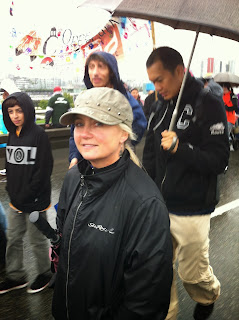 |
| With Lynne Tomlinson at Reconciliation Walk |
Last week I had the opportunity to participate in some of the events connected to Reconciliation Canada and the experiences were deeply moving. Watching the canoes come into False Creek and hearing the words of courage, hope, forgiveness and love from the range of speakers was profound. To be among thousands of people yesterday standing in the pouring rain listening to the speakers, hearing the drum beats and seeing the see of faces of so many people from such diverse backgrounds was humbling to say the least. I was grateful to share this experience with Lynne Tomlinson from West Van.
 |
| One of the canoes entering False Creek |
I was reminded of how much we have to learn as Canadians about our shared history – and how important it is that within our schools all our learners have a chance to learn, explore and experiences Indigenous ways of knowing.
I’ll close this post with a quote from the executive summary of the impact assessment conducted last spring on AESN:
I have really appreciated the message that bigotry can manifest itself as low expectations for our First Nations students. As a First Nations woman, having this message stated clearly by non-First Nations educators has been very powerful. I have witnessed educators examine their practice and ask themselves if in fact they have perpetuated this destructive pattern. I have also walked alongside teachers as they begin the journey to doing things differently. These teachers are all good, hardworking, well intentioned educators. “One of the hardest things teachers have to learn is that the sincerity of their intentions does not guarantee the purity of their practice.” (Brookfield, Becoming a Critically Reflective Teacher) – a network member
This year of networked inquiries will give us all a chance to reflect on our part in improving outcomes for all our Aboriginal learners – and on deepening the knowledge, understanding and respect of all our learners – of every age.
